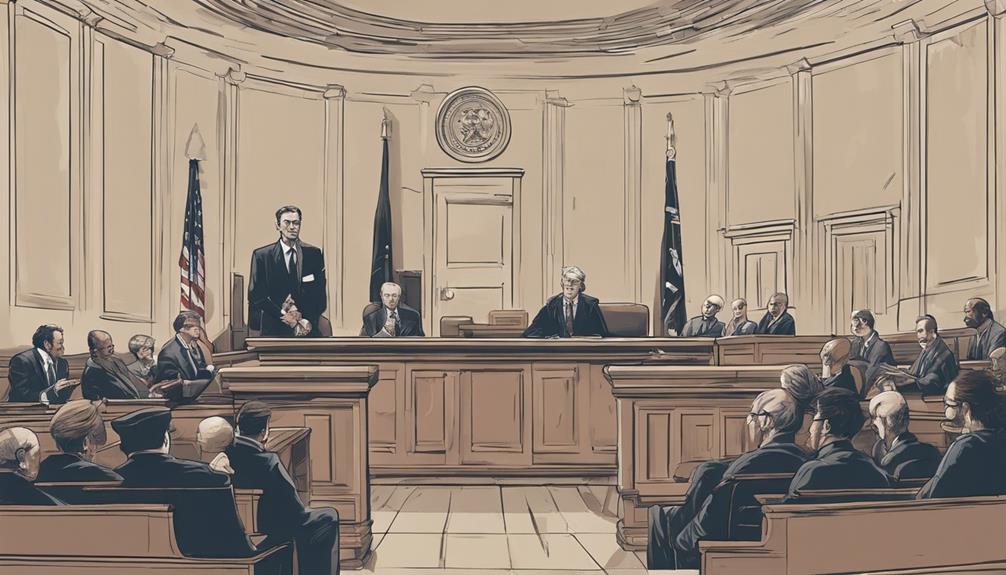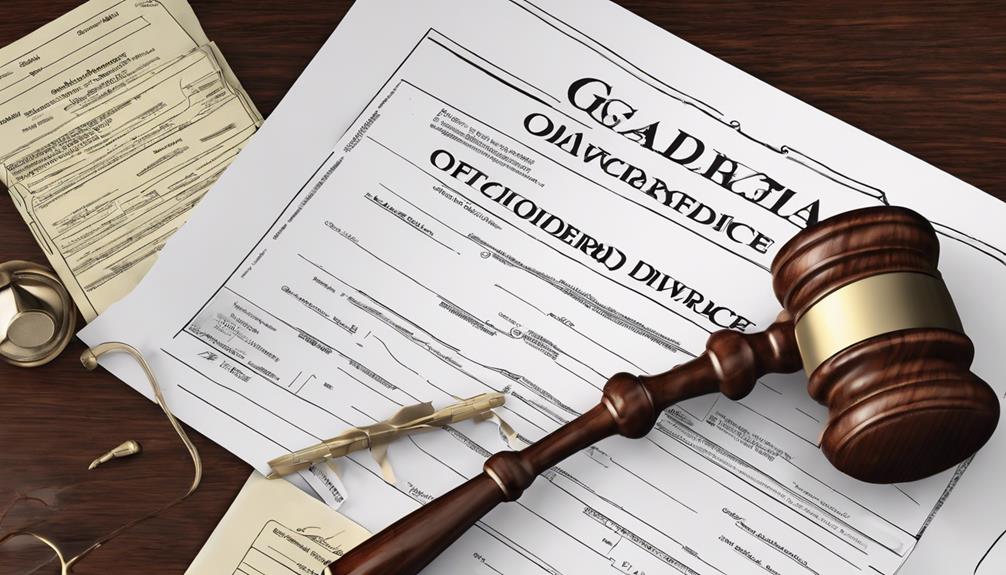Aggravated perjury is when someone knowingly provides false information while under oath with the intention to deceive, impacting official proceedings. In Texas, this crime can result in a prison sentence of 2 to 10 years, a fine of up to $10,000, and is considered a third-degree felony. Possible defenses may include retracting false statements or presenting testimony from multiple witnesses. It is crucial to emphasize the importance of evidence and witnesses in mounting a defense against aggravated perjury. The repercussions of aggravated perjury, both personally and professionally, highlight the necessity of promptly seeking legal counsel. Understanding these details is crucial when confronted with such severe legal consequences.
Key Takeaways
- Definition: Making false statements under oath with deceptive intent in official proceedings.
- Elements: False statement, under oath, materiality, intent to deceive, official proceedings.
- Penalties: Imprisonment (2-10 years), fine ($10,000), third-degree felony in Texas.
- Defenses: Retraction, witness testimony, intent inferred from circumstances.
- Implications: Career impact, legal repercussions, personal consequences, integrity importance.
Definition of Aggravated Perjury
Defining aggravated perjury involves knowingly making a false statement under oath in an official proceeding with the intent to deceive. In Texas, the false statement must be material, meaning it could impact the outcome of the official proceeding. This offense is considered a felony of the third degree in Texas, carrying a punishment of 2 to 10 years in prison.
It's important to note that retracting a false statement before it's exposed can serve as a defense against a charge of aggravated perjury. However, trivial falsifications that don't have a substantial impact on the official proceeding aren't considered material statements in aggravated perjury cases.
Understanding the precise definition of aggravated perjury is critical, as this offense carries severe legal consequences and can have a significant impact on individuals involved in official proceedings in Texas.
Elements of Aggravated Perjury
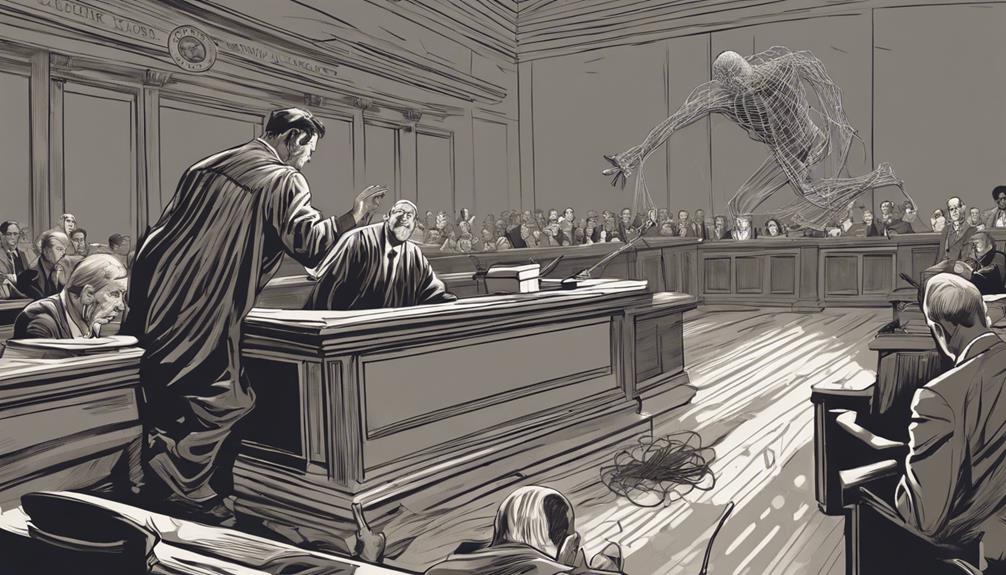
The essential components of aggravated perjury involve making a false material statement under oath in official proceedings with the intent to deceive. This serious offense requires specific elements to be met, including:
- False Statement: The individual must knowingly make a statement that isn't true.
- Under Oath: The false statement must be made while under oath, highlighting the seriousness of the deception.
- Materiality: The statement must be material, meaning it could impact the course or outcome of the official proceeding.
- Intent to Deceive: There must be a deliberate intention to mislead or deceive by providing false information.
- Official Proceedings: Aggravated perjury can occur in various official settings like court hearings, depositions, and grand jury testimonies.
These elements collectively define the nature of aggravated perjury and underline the gravity of the offense committed by those who engage in such deceptive practices.
Aggravated Perjury Penalties in Texas
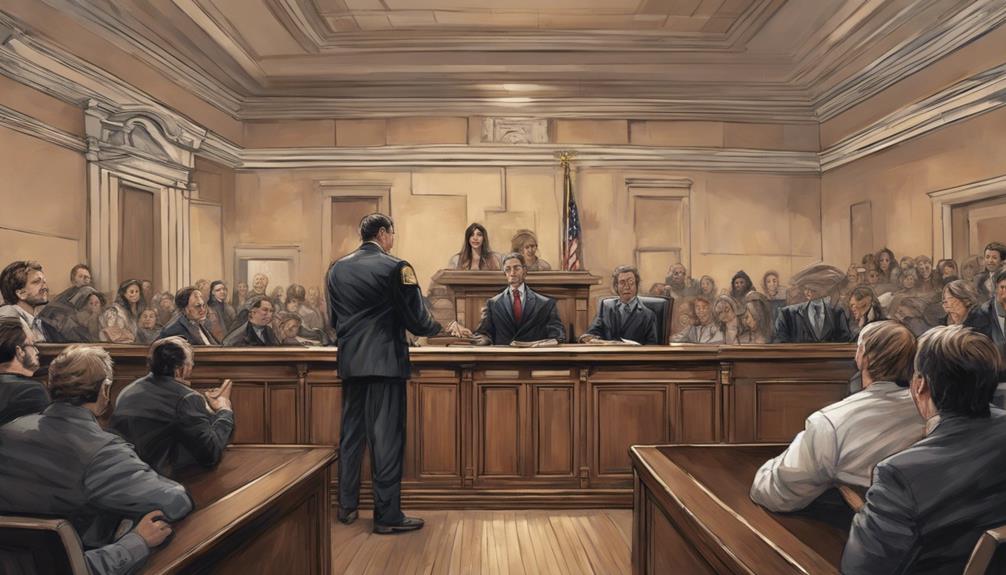
Aggravated perjury in Texas carries a penalty of two to ten years in prison and fines up to $10,000. Those found guilty of this third degree felony face significant consequences. The severity of these penalties reflects the state's commitment to upholding the integrity of official proceedings and deterring false statements made under oath. Understanding the repercussions of aggravated perjury is essential for anyone involved in legal processes in Texas.
To provide a clear overview of the penalties associated with aggravated perjury in Texas, the following table outlines the key aspects of the punishment:
| Penalty | Aggravated Perjury in Texas |
|---|---|
| Imprisonment | 2 to 10 years |
| Fine | Up to $10,000 |
| Felony Classification | Third degree |
This table succinctly summarizes the consequences individuals may face if convicted of aggravated perjury in Texas.
Defenses Against Aggravated Perjury Charges
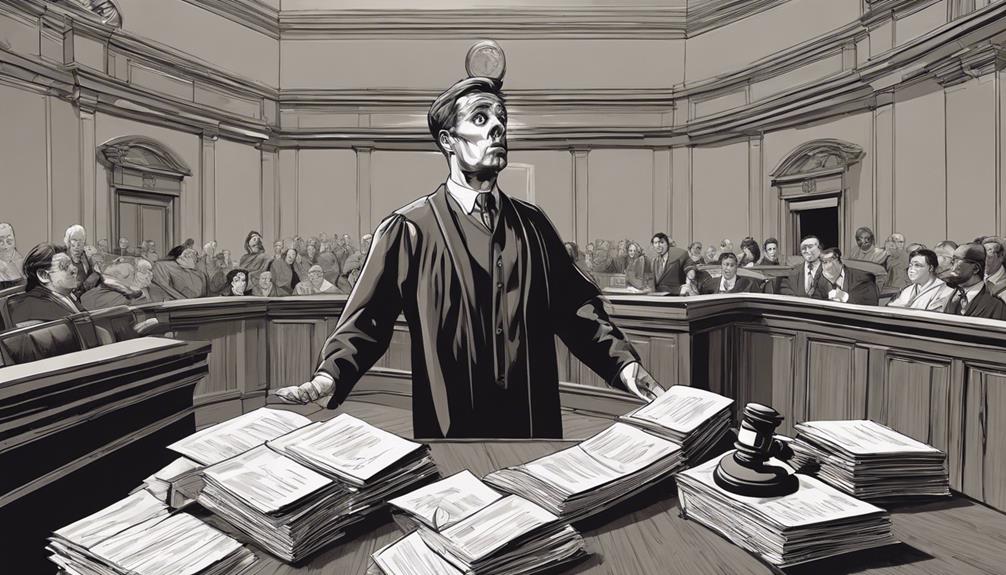
When facing aggravated perjury charges, individuals can employ legal defenses such as the affirmative defense of retraction. Retracting a false statement before its exposure in an official proceeding may serve as a defense against aggravated perjury.
In these cases, intent to deceive can be inferred from surrounding circumstances, and the testimony of at least two witnesses is typically required to prove a false statement.
Legal Defenses Overview
Retraction of a false statement before exposure in the official proceeding serves as a viable defense against aggravated perjury charges. This defense underscores the importance of correcting misinformation promptly to avoid legal consequences.
To provide a clearer understanding of legal defenses against aggravated perjury charges, consider the following key points:
- Affirmative defense of retraction allows correcting false statements before exposure in the official proceeding.
- At least two witnesses must testify to prove a false statement, highlighting the need for corroborating evidence.
- Intent to deceive can be inferred from the circumstances, emphasizing the significance of individual intentions in aggravated perjury cases.
- Irregularities in oath administration or document swearing don't serve as defenses, emphasizing the legal implications of false statements made under oath.
Evidence and Witnesses
Evidence and witnesses play a pivotal role in mounting a strong defense against aggravated perjury charges. Having concrete proof to counter false statements is essential in defending against such accusations.
Witness testimony can be a vital element in disproving allegations of aggravated perjury. Documented evidence and collaborating witnesses can greatly bolster the defense against these charges. Providing factual information and supporting evidence can effectively undermine claims of making false statements in aggravated perjury cases.
Working closely with legal professionals to develop a robust defense strategy is key to combatting aggravated perjury charges successfully. By presenting a well-supported defense backed by evidence and witness testimonies, individuals facing aggravated perjury allegations can strengthen their position in court.
Statute of Limitations for Aggravated Perjury

The statute of limitations for aggravated perjury in Texas is two years, following the same period as the primary crimes. Time begins running from the offense's commission or discovery, restricting the window for filing charges.
Once the statute of limitations expires, prosecution for aggravated perjury is no longer possible.
Time Limits for Perjury
Understanding the statute of limitations for aggravated perjury is essential for determining the timeframe within which charges must be filed. In Texas, the statute of limitations for aggravated perjury is two years.
Below are key points to take into account regarding time limits for perjury:
- The statute of limitations for aggravated perjury in Texas is two years.
- Aggravated offenses follow the same limitation period as their primary crimes.
- The statute of limitations establishes a time limit within which charges for aggravated perjury must be filed.
- After the statute of limitations expires, prosecution for aggravated perjury is typically barred.
- Understanding the statute of limitations is crucial for legal proceedings involving aggravated perjury cases.
Legal Consequences for Perjury
To comprehend the legal ramifications of perjury, particularly in cases of aggravated perjury, understanding the statute of limitations is crucial. In Texas, the statute of limitations for aggravated perjury is two years, aligning with the limitation period of the primary crimes. Timely prosecution is vital due to this two-year limitation. Delayed reporting or prosecution can hinder the ability to charge someone with aggravated perjury.
When pursuing charges for aggravated perjury in Texas, it's essential to take into account the statute of limitations. This legal timeframe underscores the importance of acting promptly in cases involving aggravated perjury to make sure that justice can be served within the constraints of the law.
Notable Aggravated Perjury Court Cases
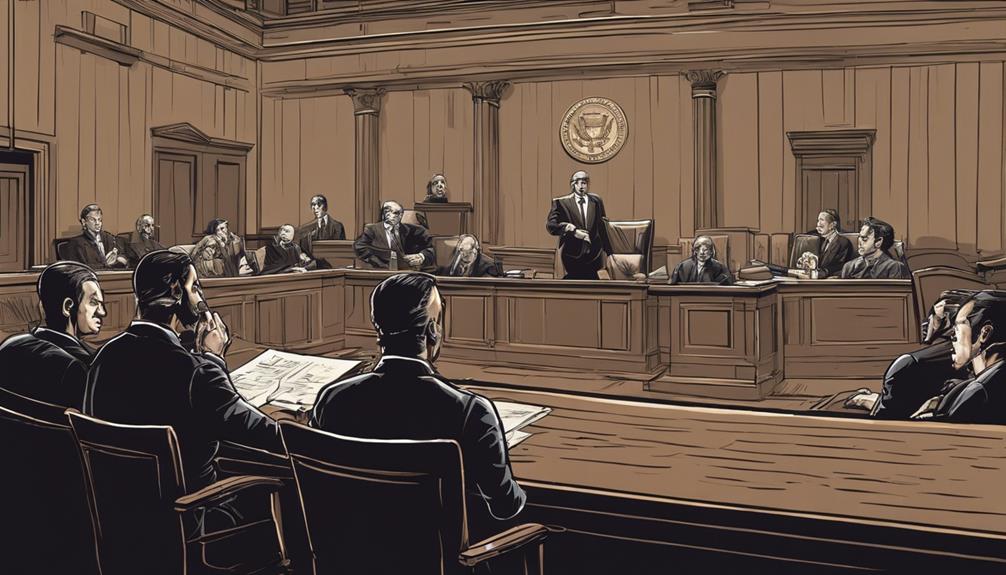
Revealing a series of notable aggravated perjury court cases sheds light on the prevalence and consequences of false testimony in legal proceedings.
- Detective Rodney Burns charged with aggravated perjury in the Ooltewah rape case.
- Burns accused of lying under oath during the preliminary hearing related to the case.
- Aggravated perjury considered a serious crime in Tennessee with severe penalties.
- Detective Burns could face imprisonment for two to four years if found guilty of aggravated perjury.
- Burns' charges of aggravated perjury have significant implications on his career and reputation.
These cases serve as reminders of the grave repercussions individuals can face when providing false testimony in legal settings. The impact of such actions not only affects the individual's personal life but also their professional standing within the community. It highlights the importance of upholding truth and integrity in the justice system to guarantee fair and just outcomes for all parties involved.
Seeking Legal Consultation for Aggravated Perjury

Legal guidance sought promptly can greatly impact the defense strategy against aggravated perjury charges. Consulting with an experienced attorney can provide valuable insights into defense strategies and potential outcomes.
Given the complexity of aggravated perjury cases, having a knowledgeable legal professional by your side can help navigate the intricacies of the legal process. Understanding the specific elements of aggravated perjury and potential defenses is vital for building a strong case.
By seeking legal advice early on, individuals can better prepare a robust defense to combat aggravated perjury accusations effectively. Additionally, legal consultation can clarify the implications of facing aggravated perjury charges and outline the necessary steps to safeguard one's rights and interests.
Hence, it's paramount for those accused of aggravated perjury to seek legal counsel promptly to guarantee a well-informed and strategic defense.
Frequently Asked Questions
Can an Individual Be Charged With Aggravated Perjury if They Were Unaware That Their Statement Was False at the Time It Was Made?
One can be charged with aggravated perjury even if unaware of the falsehood at the time of statement. Ignorance of the lie's falseness does not absolve legal responsibility in cases of perjury, as intent to deceive is a key factor.
How Does the Court Determine the Severity of Penalties for Aggravated Perjury in Texas?
In Texas, the severity of penalties for aggravated perjury is determined by various factors, such as the nature of the false statement, intent, and harm caused. Judges carefully weigh these elements to guarantee justice is served.
Are There Any Circumstances Where a Person Accused of Aggravated Perjury May Be Able to Avoid Conviction by Proving Their Innocence?
In certain circumstances, a person accused of aggravated perjury may be able to avoid conviction by providing evidence that proves their innocence beyond a reasonable doubt. This can lead to a dismissal of charges.
Is There a Difference in the Statute of Limitations for Aggravated Perjury Cases Depending on the Severity of the Offense?
In cases of aggravated perjury, the statute of limitations may vary depending on the severity of the offense. This difference can impact the time frame within which legal action can be taken against individuals accused of such crimes.
Are There Any Specific Factors That May Influence a Court's Decision in Notable Aggravated Perjury Court Cases?
Factors influencing court decisions in notable aggravated perjury cases include the credibility of witnesses, evidence quality, legal precedents, and the defendant's intent. These elements can sway a court's judgment, impacting the outcome considerably.
Conclusion
To sum up, aggravated perjury is no laughing matter in Texas. The consequences of lying under oath can result in serious legal penalties. It's best to always tell the truth to avoid getting caught up in a web of deceit and facing the harsh repercussions of aggravated perjury charges.
Remember, honesty is the best policy, especially when it comes to the law. Stay truthful, stay safe.

